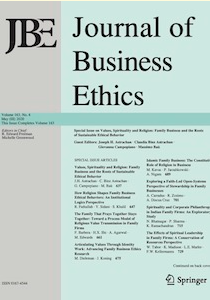Multi-Stakeholder Engagement for The Sustainable Development Goals
Abord-Hugon Nonet G., Goessling T., van Tulder R., Bryson J.M.
Journal of Business Ethics, 2022

Guest Editors
Guénola Abord-Hugon Nonet, Jönköping International Business School, Sweden
Tobias Goessling, Kedge Business School, France
Rob van Tulder, Erasmus University, The Netherlands
John M. Bryson, University of Minnesota, USA
Abstract
The world is not on track to achieve Agenda 2030—the approach chosen in 2015 by all UN member states to engage multiple stakeholders for the common goal of sustainable development. The creation of the 17 Sustainable Development Goals (SDGs) arguably offered a new take on sustainable development by adopting hybrid and principle-based governance approaches, where public, private, not for profit and knowledge-institutions were invited to engage around achieving common medium-term targets. Cross-sector partnerships and multi-stakeholder engagement for sustainability have consequently taken shape. But the call for collaboration has also come with fundamental challenges to meaningful engagement strategies—when private enterprises try to establish elaborate multi-stakeholder configurations. How can the purpose of businesses be mitigated through multi-stakeholder principle-based partnerships to effectively serve the purpose of a common sustainability agenda? In selecting nine scholarly contributions, this special issue aims at advancing this discourse. To stimulate further progress in business studies, this introductory essay, furthermore, identifies three pathways for research on multi-stakeholder engagement processes in support of the Decade of Action along three coupling lines: multi-sector alignment (relational coupling), operational perception alignment (cognitive coupling) and goal and strategic alignment (material coupling).
Editorial
- Nonet, G.AH., Gössling, T., Van Tulder, R., Bryson J.M. (2022). Multi-stakeholder Engagement for the Sustainable Development Goals: Introduction to the Special Issue. Journal of Business Ethics.
Articles in this Special Issue
- Fiandrino, S., Scarpa, F., & Torelli, R. (2022). Fostering Social Impact Through Corporate Implementation of the SDGs: Transformative Mechanisms Towards Interconnectedness and Inclusiveness. Journal of Business Ethics, 1-15.
- Alexander, A., Walker, H., & Delabre, I. (2022). A decision theory perspective on wicked problems, SDGs and stakeholders: the case of deforestation. Journal of Business Ethics, 1-21.
- Karakulak, Ö., & Stadtler, L. (2022). Working with Complexity in the Context of the United Nations Sustainable Development Goals: A Case Study of Global Health Partnerships. Journal of Business Ethics, 1-22.
- Segaro, E. L., & Haag, K. (2022). Good Intentions Gone Awry: Government Intervention and Multistakeholder Engagement in a Frontier Market. Journal of Business Ethics, 1-22.
- Williams, A., & Blasberg, L. A. (2022). SDG Platforms as Strategic Innovation Through Partnerships. Journal of Business Ethics, 1-17.
- Sebhatu, S. P., & Enquist, B. (2022). Values and Multi-stakeholder Dialog for Business Transformation in Light of the UN Sustainable Development Goals. Journal of Business Ethics, 1-16.
- Mariani, L., Trivellato, B., Martini, M., & Marafioti, E. (2022). Achieving Sustainable Development Goals Through Collaborative Innovation: Evidence from Four European Initiatives. Journal of Business Ethics, 1-21.
- Stubbs, W., Dahlmann, F., & Raven, R. (2022). The Purpose Ecosystem and the United Nations Sustainable Development Goals: Interactions Among Private Sector Actors and Stakeholders. Journal of Business Ethics, 1-16.
- Gutierrez, L., Montiel, I., Surroca, J. A., & Tribo, J. A. (2022). Rainbow Wash or Rainbow Revolution? Dynamic Stakeholder Engagement for SDG-Driven Responsible Innovation. Journal of Business Ethics, 1-24.
Link
- Read the special issue

